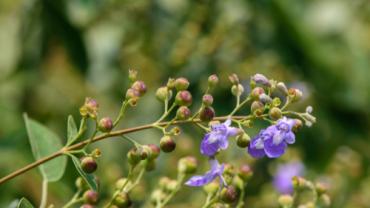
Vitex agnus-castus is better known by its common name, chaste tree or chasteberry. The name of this botanical was given in honor of its ancient use as an anaphrodisiac, but today, its common name is laced with irony since it is prized for its ability to promote fertility. The ripe, dried fruits of vitex agnus-castus possess glycosides and flavonoids, and are most often used in preparing therapeutic extracts. Occasionally, essential oils are cultivated from the fruits and leaves and used to modulate inflammation and pain, but it is not for this purpose that this botanical has earned its position in herbal medicine. Chaste tree extract seems content to predominantly occupy a unique niche in women’s health issues.
Hyperprolactinemia and Infertility
Despite the historic use of vitex agnus-castus for chastity, its most common use, by the layperson, is to improve fertility. While studies do indicate that it may be helpful in various cases of infertility, it excels in those cases wherein hyperprolactinemia may be the underlying etiology. High prolactin levels can inhibit normal ovulation and disrupt menstruation, leading to infertility. Low progesterone is another natural outcome of this cascade. Chaste tree may improve this situation as compounds of vitex agnus-castus bind to dopamine type 2 receptors in the brain, lowering prolactin secretion and restoring ovulation. In a study of 40 women with hyperprolactinaemia, prolactin was significantly reduced from 946mIU/l to 529 mIU/l, which may explain why chaste tree improved menstrual cyclicity in women with oligo-amenorrhea, sub-fertility and infertility in other studies referenced in a review from BMC Complementary and alternative Medicine. High prolactin levels may also be a secondary outcome of hypothyroidism, adrenal fatigue, or PCOS, which are commonly seen among women and indicate the importance of a comprehensive health evaluation before employing chaste tree extract.
Effects on PMS
Chaste tree is also commonly used by women for managing premenstrual syndrome. A systemic review and meta-analysis on the treatment of PMS with chaste tree published in 2017 found a large pooled effect favoring the effectiveness of chaste tree on total PMS symptoms. Irritability, mood alteration, anger, headache, bloating, and breast fullness were all significantly improved with 20mg of vitex agnus-castus extract in a study of 162 females, which sought to determine a dose-dependent effect of chaste tree.
Several mechanisms of action have been suggested, but many point to the modulation of dopamine and subsequent impact on prolactin, as mentioned above. It is also possible that chaste tree binds to opioid receptors, endorphins and neuroactive flavonoids, and may exert positive effects on the neurological symptoms associated with PMS. When the essential oil of vitex agnus-castus was used on acetic acid-induced visceral pain in rats, it showed significant analgesic effects that supported evidence of its ability to modulate the opioidergic system, which is involved in the pain, anxiety, depression, mood alterations, and mastalgia often characteristic of PMS.
Mastalgia
Over half of all women experience mastalgia (pain in the breast or mammary gland), unrelated to a serious health condition, during their lifetime. Cyclical mastalgia is not only an annoyance, but can be a factor in depression and other psychological complaints. Chaste tree has been one of the few botanicals to provide clinical success for cyclical mastalgia. The etiology of mastalgia is elusive, but it is thought that chaste tree’s dopaminergic effects and the suppression of prolactin plays a significant role in relieving breast pain. Stress-induced hyperprolactinemia has often been associated with cyclical mastalgia, explaining the usefulness of chaste tree for this condition. Mastalgia is often triggered by estrogenic activity and exploratory research suggests that chaste tree may block estrogen receptors, express anti-estrogen activity, and stimulate progesterone secretion, but further studies are needed to support this hypothesis.
Despite the suggestion of its common name, chaste tree is a superior botanical for supporting many health issues that women face during their most fertile years of life. From the gnawing pain and psychological distress of menstruation, to the most miraculous moment of a women’s life when another life begins, chaste tree can be a comforting companion to support each step of the journey.